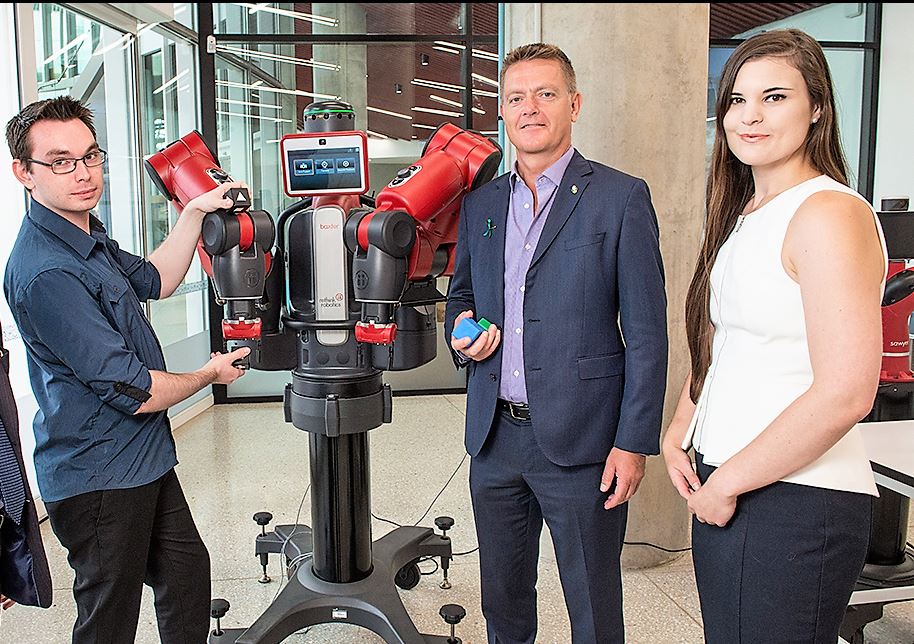
A new alliance between BAE Systems Australia and Flinders University aims to train the shipbuilding workforce of the future.
The agreement will see students and industry working together to develop new ways to provide Australia’s Defence Forces with enhanced capabilities.
BAE Systems is one of three companies bidding to build nine Anti-Submarine Warships for the Royal Australian Navy.
The company is proposing an Australian variant of the Global Combat Ship currently being manufactured in the UK for the Royal Navy.
Flinders University will receive access to BAE Systems’ digital shipbuilding tools, processes and methodologies and turn this into development programs to train the people who will build the Future Frigates and integrate the ships’ complex operating systems, if the company is successful in its SEA 5000 bid.
Collaboration in research and development will have an emphasis on autonomous underwater vehicles, a future technology that could greatly enhance Australia’s capability to detect and deter submarines.
In the UK, BAE Systems collaborates with Sheffield University’s Advanced Manufacturing Research Centre, directly supporting automation and the exchange of advanced manufacturing technologies.
Through this relationship, Flinders University and Sheffield University will be able to share information and best practice on successful training applications, research and development, and identify areas of mutual interest.
The first project under this agreement will be focused on advanced manufacturing components for the Joint Strike Fighter, which will help to inform future applications on other defence programs.
BAE Systems Australia Chief Executive, Ms Gabby Costigan, says: “Complex defence projects rely on highly skilled people and world class innovation.
“I am delighted that we can bring our capabilities and global expertise to the table so that we can work more closely with one of Australia’s leading academic institutions to nurture a highly skilled workforce that is ready to deliver the high-tech, complex programs our Defence Forces require,” Ms Costigan says.
Flinders University Vice-Chancellor, Professor Colin Stirling, says Flinders University welcomes this important connection with BAE Systems.
“The opportunity to work with leading international partners is aligned with Flinders’ strategic priorities and we look forward to working collaboratively on research and training initiatives that are supporting Australia’s advanced manufacturing industry, furthering research and contributing to employment and economic growth,” Professor Stirling says.
The collaboration between BAE Systems and Flinders University will contribute to the aims of the Naval Shipbuilding College, which is charged with working with industry and all academic institutions to support the national shipbuilding endeavour by skilling up a local workforce
BAE Systems has been providing some of the world’s most advanced, technology-led defence, aerospace and security solutions for the Australian Defence Force for 65 years.
The company employs around 3,500 people and is Australia’s largest provider of maritime sustainment in Australia, supporting the Guided Missile Destroyers, the ANZAC Class Frigates, the Landing Helicopter Dock ships, the Adelaide Class Frigates and the Hydrographic Fleet.
Last year Flinders University has become a member of BAE Systems Australia’s Joint Open Innovation Network (JOIN), a national initiative to drive research, development and innovation of defence technologies.
The Joint Open Innovation Network will focus on activities to support the upgrade of the Jindalee Operational Radar Network (JORN) and the development of future JORN and intelligence surveillance reconnaissance capability.
With 90% of Flinders’ research has been ranked at or above world standard by Excellence in Research for Australia, the University’s research strengths include defence, engineering, molecular science and technology.
Flinders University, with its Tonsley Manufacturing Innovation Hub, is actively linking with international institutions to build collaborative networks in the areas of defence industry R&D, and more broadly around Industry 4.0 and advanced manufacturing.

